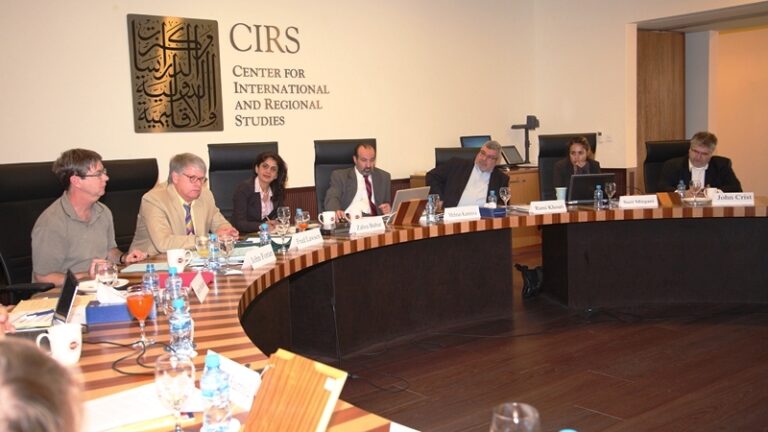Focused Discussions, Regional Studies
The Evolving Ruling Bargain in the Middle East Working Group I

On February 19–20, 2012, CIRS held a two-day working group meeting on the topic “The Evolving Ruling Bargain in the Middle East.” Several scholars and experts on the Middle East were invited to CIRS at Georgetown University’s Qatar (GU-Q) campus to take part in the discussions. At the conclusion of the research initiative, the working group participants will contribute chapters towards a book on the subject.
As a preliminary consideration before commencing presentations and discussions, the participants questioned the terms of the debate and offered different analyses of what “ruling bargain” might mean in different contexts and how this term differs from the notion of a “social contract.” There was consensus that every state-society relationship is bound by an unwritten and informal hegemonic understanding in the form of a social pact between the ruler and the ruled whether authoritarian or otherwise. In many countries of the Arab world, this general understanding between state and public has been less of a “bargain” and more of a top-down “imposition” of governance. However, the participants acknowledged that whether in authoritarian or democratic countries, the terms of a social contract are in a state of constant flux and are negotiated on a daily basis whether peacefully or through violent means of resistance and uprisings.
The participants identified the necessary methodological threads that bring together the various issues as well as the general theoretical tropes that will run throughout the project. A central theme that emerged is the nature of the relationship between the citizen and the state in the Middle East and how this has been renegotiated through citizen action. For the first time in modern Arab history, there have been demands for an alignment between the individual; the communal group whether gender-based, religious, ethnic, or tribal; civil society organizations; and government agencies. The participants argued that it was always important to discuss the Arab Spring at the level of the individual and how Mohamed Bouazizi’s spontaneous act of self-immolation resonated with millions of people across the region who shared similar grievances.
Although there have always been formal opposition parties in many Middle East states in one form or another, these functioned as part of the status quo and served as mechanisms of legitimation of the authoritarian state. The public protests that constitute the Arab Spring are a means by which publics in Egypt, Libya, and Tunis, as well as in other countries voice their dissatisfaction with the status quo. These protests are unprecedented and reveal the existence of a whole generation of people who demand change and who are, in effect, the informal opposition. People have carved out a platform within which they are active agents of change who are able to negotiate questions of power, identity, jurisprudence, and accountability. Media networks such as Al Jazeera, informal social media platforms, and human communication networks more generally acted as catalysts for transmitting ideas that have had far-reaching consequences and have inspired people all over the world to forge vibrant and creative political cultures of resistance.
Other issues that were discussed during the meeting include the effect of the Arab Spring on the rise of Islamist parties such as the Muslim Brotherhood; the effect of foreign influence on social unrest; the active participation of women in the political arena; questions of constitutional reform; future international relations and foreign policies; and the emergence of new political parties and discourses that have long been absent in many Middle Eastern countries. In addition, the scholars analyzed specific case-studies related to the situations in Syria, Libya, Egypt, Bahrain, Iran, Yemen, and Tunis. Although each country has its own set of complex political dynamics dictating possible outcomes, the participants also discussed the reasons why people in Morocco and Algeria did not join in public protests.
Towards the conclusion of the working group meeting the participants cautioned about using the word “revolution” to describe the uprisings in the Middle East. Even though they agreed that tremendous changes have taken place, they questioned whether it was possible to completely eradicate ingrained patronage networks and whether these post-authoritarian regimes would actually transition to democracies. A cloud of uncertainty still lingers over the fate of all these countries and so, during these unpredictable times, it is important to ask “what happens next?”
- Click here for the working group’s agenda
- Read more about the research initiative
Participants and Discussants:
Abdullah Al-Arian, Wayne State UniversityHatoon Al-Fassi, Qatar University; King Saud UniversityMazhar Al-Zo’by, Qatar UniversitySaïd Amir Arjomand, The Stony Brook Institute for Global StudiesZahra Babar, CIRS – Georgetown University School of Foreign Service in QatarJohn T. Crist, CIRS – Georgetown University School of Foreign Service in QatarMichael Driessen, CIRS – Georgetown University School of Foreign Service in QatarMarie Duboc, American University in CairoJohn Foran, International Institute for Climate Action Theory; University of California, Santa BarbaraShahla Haeri, CIRS – Georgetown University School of Foreign Service in QatarShadi Hamid, Brookings Doha CenterNader Hashemi, Josef Korbel School of International Studies at the University of DenverThomas Juneau, Department of National Defence, Government of CanadaMehran Kamrava, CIRS – Georgetown University School of Foreign Service in QatarJackie Kerr, Georgetown University School of Foreign Service in QatarRami George Khouri, Issam Fares Institute for Public Policy and International Affairs at the American University of BeirutBahgat Korany, American University in CairoFred H. Lawson, Mills CollegeMiriam Lowi,The College of New JerseyMari Luomi, CIRS – Georgetown University School of Foreign Service in QatarQuinn Mecham, Middlebury CollegeSuzi Mirgani, CIRS – Georgetown University School of Foreign Service in QatarGerd Nonneman, Georgetown University School of Foreign Service in QatarJames C. Olsen, Georgetown University School of Foreign Service in QatarAhmad H. Sa’di, Ben-Gurion UniversityDirk Vandewalle, Dartmouth College
Article by Suzi Mirgani, Manager and Editor for CIRS Publications